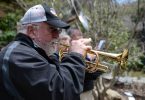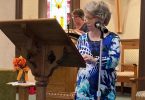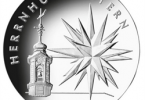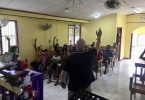When the World Council of Churches (WCC), the largest ecumenical organization in the world, held its 11th assembly in Germany in 2022, the Rev. Andrew Heil represented the Moravian Church of North America.
More than 350 churches from 120 counties around the world make up this Christian fellowship. It meets every eight years to discuss common issues around the world as well as create a time of renewal for its members. The latest assembly was held in Karlsruhe, Germany with the theme “Christ’s Love Moves the World to Reconciliation and Unity.”
More than 6,000 people attended this assembly. Moravians from around the Unity were in attendance, including representatives from Antigua, Denmark, England, Germany, Jamaica, Nicaragua, South Africa, Sweden, Switzerland, Tanzania and the United States.
The Moravian Church is a founding member of WCC, and in North America, work in partnership with Evangelical Lutheran Church in America, The United Methodist Church, Presbyterian Church (USA) and The Episcopal Church. As stated in the Moravian Ground of the Unity: “Through the grace of Christ, the different churches have received many gifts. It is our desire that we may learn from each other and rejoice together in the riches of the love of Christ and the manifold wisdom of God.” The Moravian Church is committed to working and learning with others for the betterment of the world.
Regional meetings were held, and Andrew attended one for the United States and Canada. One task was to choose a president to represent the region. In conversations about the primary concerns of the churches in the US and Canada, attendees were nearly unanimous in identifying the areas of systemic racism, mistreatment of indigenous people, economic injustices and the mistreatment of the land. The group discussed how vital this conversation was for where the region is at in this time, that people are suffering and the need to address these issues.
During one of the central business sessions, the Rev. Amilcar Padilla Curbelo from Nicaragua was elected as the Moravian representative to the WCC’s Central Committee.
The assembly prioritized the issues of greatest concern. “Indigenous churches spoke openly about churches like the ones in North America, and how they are sowing hardship for other parts of the world,” said Andrew. “It was discussed as to what we need to do to address these global inequalities, including economic justice and stewardship…there is a need for followers of Jesus to do more.”
The assembly issued a written acknowledgements of human suffering and violations of human dignity—some being named publicly for the first time. Many marginalized people spoke up about what injustices the people in their country face. This assembly was a platform to share this with others. One of Andrew’s key takeaways from the assembly was that listening is a practice for reconciliation and unity. It is important to make space for someone’s voice to be heard.
Moravians have many gifts in the ecumenical movement. A steward from Jamaica shared with Andrew that, “Moravian ministers stand out as approachable.” Other denominations view the Moravians as unique. Although the church is small in number, their presence is profound, where others seemed to take seriously what Moravians say. “They see that we want to learn from other churches and that we are hospitable to different expressions and experiences of Christ and the gospel,” said Andrew. “How Moravians contribute is breaking through barriers. We need to continue to evaluate if we are modeling and living up to what others see in us.”
Andrew reflected on this perception, looking at what the theology is behind this belief. “It’s our vision for service, acting with humility and compassion for other people that define how others see Moravians,” continued Andrew. “The authority we have been given is the authority of Christ. If there is power, it’s the power of the cross, not to the individual.”
The assembly also looked at the impact of the pandemic on church and society and they realize that that story is still being written. It is very clear how churches responded, but it was difficult for any church to articulate far into the future what this is going to mean to the church. What is the impact on ministry? How we practice in community? How we respond to injustices? It’s too early to tell.
“I want to express my sincere gratitude for the beautiful opportunity to connect with Moravians around the world…and to listen and carry forwarded what God is doing,” said Andrew. “I was able to give attention to new ways we can work together in the hopes that God will use us.” n
Sue Kiefner, IBOC, developed this summary from a special presentation made by the Rev. Andrew Heil. For Andrew’s full presentation, click here.






